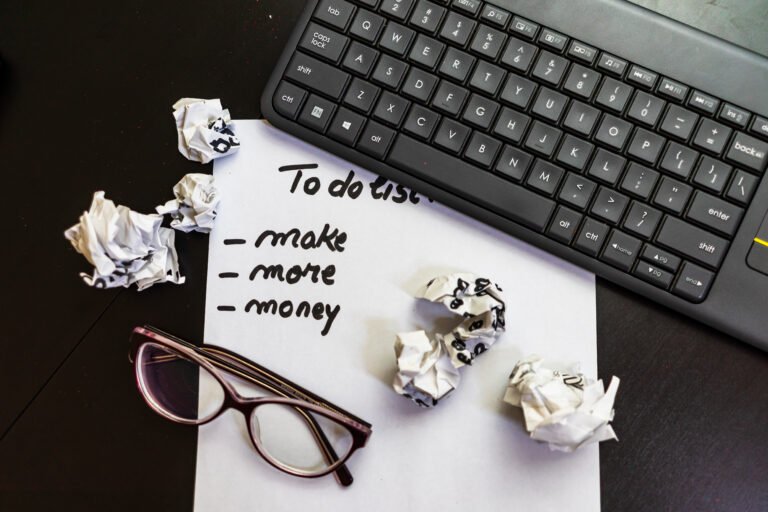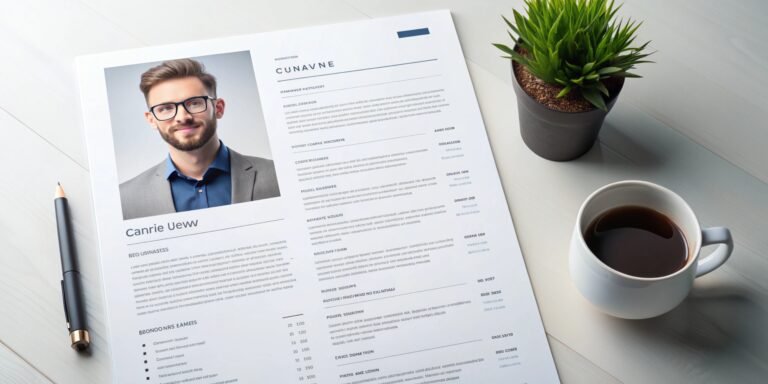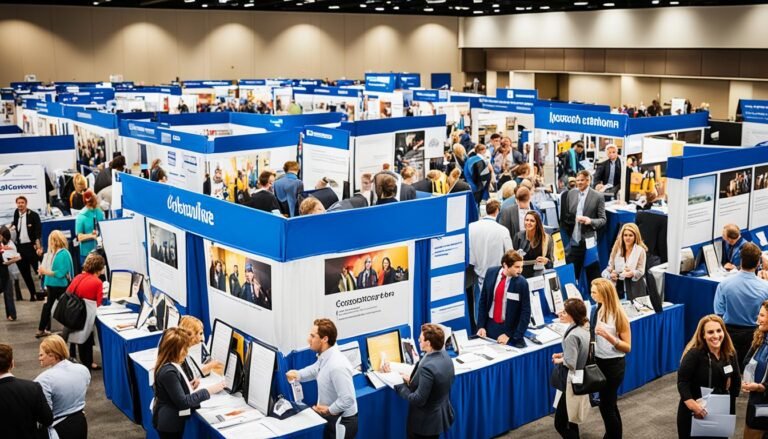Job Fair Etiquette: Do’s and Don’ts for Employers and Job Seekers
Have you pondered the pivotal role of Job Fair Etiquette in shaping your career prospects? It transcends mere attendance; it’s about forging connections that could lead to interviews and job offers. Career fairs, typically held at the semester’s outset, offer a crucial platform for both job seekers and employers to connect profoundly1. Yet, many overlook the significance of preparation and networking, focusing excessively on the event itself2.
For job seekers, an early arrival can significantly boost your chances of engaging in meaningful dialogues and capturing the attention of recruiters when they are most receptive1. Conversely, employers can gain a competitive advantage by fostering a hospitable atmosphere for potential candidates. Adhering to job fair etiquette is vital for capitalizing on opportunities, ensuring both parties depart with valuable insights and connections.

Understanding the Importance of Job Fairs
Job fairs, commonly known as career fairs, are crucial for connecting job seekers with potential employers. These events are pivotal in offering recruitment opportunities for those aiming to progress in their careers. With over 300 employers participating in a single event, each attendee can anticipate approximately 3.6 minutes of interaction with various representatives3. This direct engagement with employers provides a unique platform for individuals to showcase their skills and qualifications in a more personal manner.
Recruiters often encounter hundreds of candidates in a single day, underscoring the competitive nature of these events4. Despite varying opinions on their effectiveness, many employers consistently return to career fairs. This commitment reflects their dedication to connect with students and potential candidates, even if it’s primarily to fulfill federal employment regulations3. Moreover, these fairs frequently include seminars on crucial topics like resume writing and interview skills, offering additional learning opportunities for attendees.
The Role of Job Seekers at Career Fairs
At career fairs, job seekers are integral, contributing significantly through their active engagement. Their duties go beyond mere attendance; they must thoroughly research employers and grasp the job market dynamics. This foresight facilitates effective networking, setting the stage for impactful dialogues with recruiters.
Engagement with recruiters is paramount. Job seekers must capitalize on opportunities to showcase their skills and experiences. Given that recruiters’ interest wanes towards event’s end5, the timing of these interactions is critical. Individual meetings with recruiters ensure undivided attention, a strategy that counters the recruiter’s potential overwhelm from interviewing numerous candidates simultaneously5.
Adopting appropriate attire is a key strategy for making a favorable first impression. For those on a budget, non-profit organizations may provide assistance in acquiring professional attire for these events5. Such attire not only elevates confidence but also projects a professional image, aligning with employers’ expectations.
Strategic planning is crucial for job seekers. They should be prepared to solicit feedback, document conversations, and follow up swiftly. Proactive engagement throughout the fair enhances visibility and lays a solid groundwork for future interactions, thereby bolstering their job search outcomes. Studies show that early arrival and broad recruiter engagement significantly boosts the chances of securing a position6.
Job Fair Etiquette: Key Principles for Success
Job fairs are crucial for connecting job seekers with potential employers. Mastering the etiquette of these events is vital for a positive impression. Strategies such as exuding confidence and dressing professionally are key. These elements significantly shape recruiters’ opinions.
Making a Positive First Impression
First impressions are fleeting, yet they profoundly impact recruiters’ perceptions of candidates. Nonverbal cues, such as body language and eye contact, are crucial. A warm greeting and a confident introduction are essential. They not only convey professionalism but also help you stand out among many.
It’s advisable to prepare at least 20 copies of your resume for distribution. This facilitates connections with various companies78.
Professional Attire for Job Fairs
Wearing appropriate attire is crucial at job fairs. Choose neat, tailored clothing that reflects your industry while allowing for personal flair. Business casual attire is recommended, with a focus on comfortable shoes for ease of movement9. Dressing professionally demonstrates your commitment to the opportunity and respect for employers’ time.
| Attire Type | Description | Example |
|---|---|---|
| Business Casual | A blend of professional and casual clothing, allowing expressiveness while maintaining a polished look. | Polished slacks with a blazer and a collared shirt. |
| Formal Business | Designed for high-stakes environments, aiming for maximum professionalism. | Suit and tie or formal dress for women. |
| Comfortable Footwear | Important for long hours of standing and walking during events. | Closed-toe flats or professional loafers. |
Do’s for Job Seekers: What to Embrace
For those navigating the realm of career fairs, certain strategies can dramatically boost success. Adopting effective job fair tips can facilitate impactful interactions, thereby enhancing the likelihood of securing employment.
Arrive Early to Maximize Opportunities
Early arrival offers a distinct advantage, allowing job seekers to connect with recruiters at peak energy levels. This often translates into more productive discussions, offering deeper insights into job roles and corporate cultures. Moreover, early birds frequently gain first dibs on valuable resources and insights.
Prepare a Targeted Resume
Targeted resume preparation is indispensable for job seekers. Tailoring resumes to specific employers significantly increases the chances of capturing attention in a competitive arena, where career fairs can attract between 10 to 400 employers10. Ensuring multiple copies are on hand enables instant distribution to interested employers.
Practice Your Elevator Pitch
Mastering the elevator pitch is paramount. This concise overview, spanning 10 to 30 seconds, enables job seekers to efficiently convey their skills and career goals to potential employers. It’s crucial to tailor the pitch to the audience, as encounters can range from academic representatives to industry experts1112.
Don’ts for Job Seekers: What to Avoid
Attending a job fair can be a pivotal moment for job seekers, yet certain behaviors must be eschewed for a positive outcome. Mastery of job fair conversation etiquette is paramount for crafting a memorable impression. Avert negative behaviors at job fairs to distinguish oneself for the right reasons.
Avoid the “Grab and Dash” Behavior
The “grab and dash” behavior, where candidates seize promotional items without engaging in substantive dialogue, is a notable misstep. Such behavior not only reflects a lack of professionalism but also leaves recruiters with a detrimental impression of the candidate. Prospective employees should prioritize establishing authentic connections and engaging in meaningful discourse to leave a lasting impression.
Don’t Overstay Your Welcome
Job seekers must be cautious not to overextend their welcome during interactions with recruiters. Typically, meetings with employers are brief, lasting only 2-3 minutes13. It is essential to respect the time of recruiters by being succinct yet informative. This approach not only embodies effective job fair conversation etiquette but also facilitates the opportunity for all attendees to network. It allows more candidates to be evaluated and considered.
Do’s for Employers: Best Practices to Follow
Employers at job fairs must employ specific strategies to enhance their engagement and representation. Adopting best practices significantly increases the probability of drawing in top talent. A crucial approach is to staff your booth with knowledgeable representatives. This ensures effective communication about job openings and the company culture, making a positive first impression on visitors.
Staff Your Display with Knowledgeable Representatives
Ensuring at least one representative is present at the booth at all times can significantly boost the likelihood of connecting with potential candidates14. A team of no more than five members is recommended for varied interactions, reaching a broader audience. Each representative should be well-versed in the company’s values and prepared with tailored talking points to foster meaningful conversations15.
Be Welcoming and Engaging
Employers should stand in front of their booth and proactively engage with attendees. Adopting a welcoming demeanor prompts open-ended questions that allow candidates to express their interests in specific career opportunities14. Creating an inviting atmosphere with promotional materials like branded items and tangible giveaways attracts job seekers’ attention15. Following up with engaged candidates after the event further enhances prospects for successful recruitment, as those who follow up promptly access the best candidates14.

Don’ts for Employers: Common Pitfalls to Sidestep
Employers must approach job fairs with a keen awareness to dodge critical mistakes that could undermine their recruitment efforts. Acknowledging several prevalent pitfalls can steer clear of adverse interactions with potential candidates. It is crucial that the experience mirrors professional demeanor at job fairs.
Don’t Dismiss Candidates Prematurely
One of the most common errors employers make at job fairs is prematurely dismissing candidates. Each candidate brings unique skills and experiences that may not immediately align with current vacancies. Neglecting to evaluate these individuals could result in missing out on talent that could significantly contribute in various roles down the line.
Avoid Being Overly Rude or Dismissive
Displaying rudeness or dismissiveness can irreparably damage a company’s reputation. Representatives should interact with candidates with politeness, as their behavior not only showcases their professionalism but also influences how the company is viewed in the job market. Engaging with courtesy creates a positive atmosphere that motivates candidates to consider opportunities within the organization.
Networking Tips for Job Fairs
Effective networking at job fairs transcends mere card exchanges. It necessitates a strategic approach, aimed at forging connections with recruiters and peers. A well-crafted introduction can significantly impact the initial impression, laying the groundwork for substantive dialogue16.
Active listening is paramount in fostering effective communication, facilitating engaging exchanges. Open-ended questions can elevate the caliber of discussions, fostering authentic connections. Post-interaction note-taking proves invaluable for recalling pivotal points, aiding in subsequent follow-ups.
Arriving early at job fairs mitigates overwhelm and amplifies the likelihood of impactful connections17. Possessing 15 resumes and business cards prepares one for multiple engagements16.
For virtual job fairs, a professional setup is essential. A clutter-free backdrop and appropriate attire, even from home, signals professionalism18. Anticipatory research on employers enhances interaction quality, enabling candidates to pose insightful queries18.
Mastering networking can significantly boost the likelihood of securing employment at fairs, highlighting the importance of professional networks in the job hunt17. Engaging in early career preparation diminishes the intimidation often felt during job searches17.
Job Fair Follow-Up Etiquette for Candidates
Following up after a job fair is essential for strengthening connections made during the event. A prompt follow-up email, sent within 24 hours, should convey gratitude for the recruiters’ time and reaffirm interest in the discussed opportunities. Research indicates that approximately 50% of candidates send thank-you notes post-job fair, providing a notable opportunity to distinguish oneself in a competitive market19.
In your email, referencing specific details from your initial meeting can be advantageous. Personal connections aid in recruiters’ memory recall, especially when they encounter numerous candidates. Recruiters appreciate candidates who exhibit effective follow-up tactics, such as mentioning topics discussed during the meeting20. This approach not only highlights your professionalism but also underscores the significance of nurturing connections post-event.
While attaching your resume might not be mandatory, maintaining a professional tone is paramount. Recruiters often manage a plethora of emails, making a well-thought-out message crucial. Such a message can ensure you remain top of mind, enhancing your likelihood of being considered for available roles21.
Source Links
- https://prosple.com/career-planning/a-students-guide-to-a-great-career-fair – A student’s guide to a great career fair
- https://www.jobfrog.com.au/preparing-for-a-job-fair/ – Preparing for a Job Fair: Dos and Don’ts
- https://www.asktheheadhunter.com/10112/job-fairs – Ask The Headhunter® – The Truth About Job Fairs
- https://www.msa-ps.com/the-dos-and-donts-of-career-fair-qa/ – The Do’s and Don’ts of Career Fair Q&A – MSA
- https://www.linkedin.com/pulse/dos-donts-recruiters-wish-you-knew-when-attending-job-starleeta-brown – The Do’s and Don’ts That Recruiters Wish You Knew About When Attending A Job Fair.
- https://resources.workable.com/tutorial/job-fair-recruitment – Job fair recruitment: A planning guide for employers
- https://www.themuse.com/advice/8-ways-to-stand-out-at-a-career-fair – The 8 Best Tips to Stand Out at a Job Fair
- https://careerservices.cns.utexas.edu/resources/career-fair-guide/preparing-career-fairs – Preparing for Career Fairs
- https://joinhandshake.com/blog/students/10-tips-to-make-the-most-of-college-career-fair/ – 10 tips to make the most of your college career fair
- https://www.atsinc.com/blog/careers/job-fair-tips – Job Fair Do’s and Don’ts [For Job Seekers and Students]
- https://birkman.com/resources/articles/how-to-attract-the-best-job-candidates-at-career-fairs – How to Attract the Best Job Candidates at Career Fairs | Birkman
- https://topresume.com/career-advice/job-fair – How to Prepare for a Career or Job Fair
- https://www.monster.com/career-advice/article/how-to-dress-for-job-fairs – What to Wear to a Job Fair: How to Choose a Professional Outfit for a Career Fair
- https://southbend.iu.edu/students/career-services/career-events/career-fair/employers/emp-tips.html – Job Fair Tips For Employers: Employers: Career and Internship Fair: Events: Career Services: Students: Student Affairs and Diversity: Indiana University South Bend
- https://www.epromos.com/education/tradeshows/career-fair-tips/ – 15 Career Fair Tips For Employers Looking to Attract Top Talent
- https://www.premiertalentpartners.com/post/career-fair-etiquette – Career Fair Etiquette
- https://www.kdp.org/teacher-resources/career-center/networking-and-job-fairs – Networking and Job Fairs – Kappa Delta Pi
- https://joinhandshake.com/blog/students/attending-a-virtual-career-fair-here-are-10-tips-you-need-to-know/ – Attending a virtual career fair? Here are 10 tips you need to know
- https://www.suu.edu/careercenter/careerfair-etiquette.html – Career Fair Etiquette | SUU
- https://careerservices.fas.harvard.edu/blog/2023/10/20/the-right-way-to-follow-up-after-a-career-fair-2/ – The Right Way to Follow-Up After a Career Fair
- https://www.linkedin.com/pulse/job-fair-etiquette-olivia-j-chavez – “Job Fair Etiquette”







